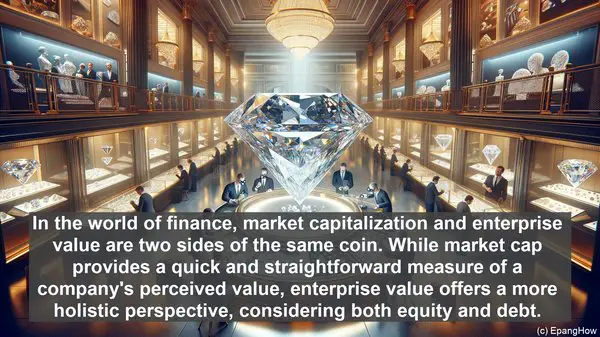Introduction: The World of Financial Metrics
Hello everyone! Welcome to another insightful article on the world of finance. Today, we’re going to explore the intriguing realm of market capitalization and enterprise value. These two metrics play a pivotal role in assessing the value of a company, but they differ in their approach and implications. So, let’s dive in!

Market Capitalization: The Popular Metric
Market capitalization, often referred to as ‘market cap,’ is a widely used metric to gauge a company’s value. It is calculated by multiplying the company’s current stock price by the total number of outstanding shares. The resulting figure represents the total market value of the company, as perceived by the market. Market cap is a crucial metric for investors, as it provides a quick snapshot of a company’s size and relative worth in the market. For instance, a company with a market cap of $100 billion is generally considered larger and more valuable than a company with a market cap of $10 billion.

Enterprise Value: A Holistic Perspective
While market cap focuses solely on a company’s equity value, enterprise value takes a more comprehensive approach. Enterprise value considers not only the equity value but also factors in the company’s debt and other obligations. It is calculated by adding the market value of equity, total debt, minority interest, and preferred shares, and then subtracting any cash and cash equivalents. Enterprise value essentially represents the total value that would be required to acquire the entire company, including its debt. This metric is particularly useful in evaluating potential acquisitions, as it provides a more accurate picture of the company’s true cost.
Comparing the Two Metrics
One of the key differences between market cap and enterprise value lies in their focus. Market cap primarily reflects the market’s perception of a company’s equity value, while enterprise value encompasses both equity and debt. Additionally, market cap is influenced by the company’s stock price, which can fluctuate significantly based on market sentiment. On the other hand, enterprise value is relatively more stable, as it considers the company’s overall financial structure. Another notable distinction is the use case of these metrics. Market cap is often used to categorize companies into different market segments, such as large-cap, mid-cap, or small-cap. Enterprise value, on the other hand, is crucial in financial modeling, valuation, and M&A activities.
Significance in Financial Analysis
Both market cap and enterprise value have their significance in financial analysis. Market cap is frequently used to assess a company’s relative size and attractiveness for investment. It can also be used as a benchmark to compare companies within the same industry. Enterprise value, on the other hand, provides a more accurate measure of a company’s value, especially when comparing companies with varying debt levels. It is also a key input in financial ratios like EV/EBITDA, which is widely used in valuation analysis. By considering both market cap and enterprise value, analysts can gain a more comprehensive understanding of a company’s financial standing.
